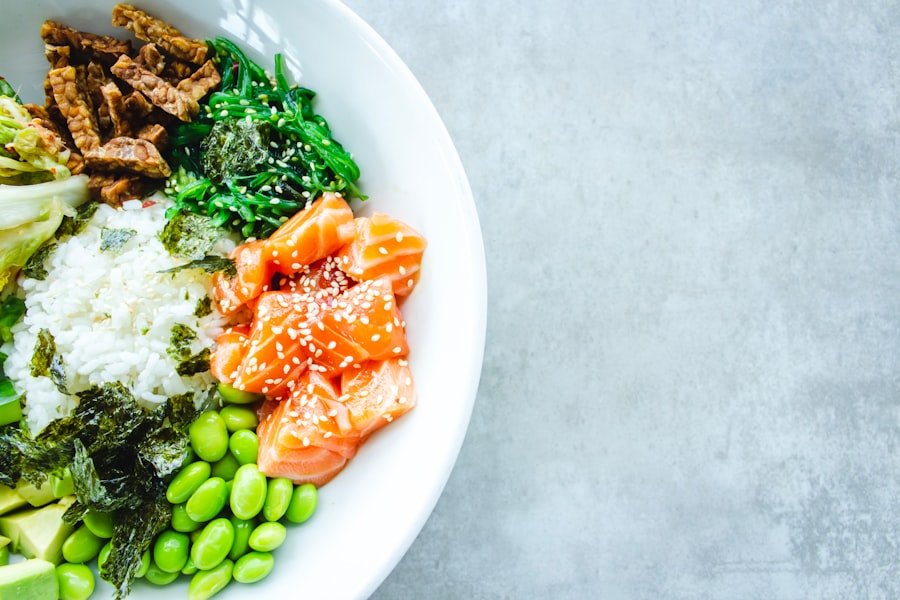
Fueling Your Performance: The Importance of Nutrition for Athletes
Proper nutrition plays a crucial role in athletic performance. Athletes require a well-balanced diet to fuel their bodies and provide the necessary nutrients for optimal performance. Whether it’s a professional athlete or someone who enjoys recreational sports, nutrition is key to achieving their goals.
Nutrition provides the body with the energy it needs to perform at its best. It helps athletes maintain a healthy weight, build and repair muscles, and recover from intense workouts. Without proper nutrition, athletes may experience fatigue, decreased endurance, and increased risk of injury.
Key Takeaways
- Proper nutrition is essential for optimal athletic performance.
- Athletes have unique nutritional needs that must be met to support their training and competition.
- Macronutrients, including carbohydrates, proteins, and fats, are important for fueling the body during exercise.
- Micronutrients, such as vitamins and minerals, play a crucial role in athletic performance and recovery.
- Adequate hydration is essential for optimal athletic performance and should be a top priority for athletes.
Understanding the Nutritional Needs of Athletes
The nutritional needs of athletes differ from those of non-athletes due to the increased physical demands placed on their bodies. Athletes require more calories to fuel their workouts and support their training regimen. The type and amount of nutrients needed also vary depending on factors such as age, gender, and sport.
For example, endurance athletes like marathon runners require a higher intake of carbohydrates to provide the necessary energy for long-distance running. Strength athletes, on the other hand, may require more protein to support muscle growth and repair. It’s important for athletes to understand their individual needs and tailor their diet accordingly.
Macronutrients: Fueling Your Body with Carbohydrates, Proteins, and Fats
Macronutrients are the main sources of energy for the body and include carbohydrates, proteins, and fats. Each macronutrient plays a specific role in athletic performance.
Carbohydrates are the body’s primary source of energy and are essential for high-intensity exercise. They are stored in the muscles as glycogen and are used during physical activity. Athletes should aim to consume complex carbohydrates such as whole grains, fruits, and vegetables for sustained energy.
Proteins are crucial for muscle growth and repair. They help rebuild damaged muscle tissue after intense workouts and support the development of lean muscle mass. Athletes should include lean sources of protein such as chicken, fish, beans, and tofu in their diet.
Fats are another important source of energy for athletes, especially during low-intensity exercise. They provide a concentrated source of energy and help the body absorb fat-soluble vitamins. Athletes should focus on consuming healthy fats such as avocados, nuts, and olive oil.
Balancing these macronutrients is essential for optimal performance. Athletes should aim to consume a mix of carbohydrates, proteins, and fats in their meals and snacks to provide sustained energy and support muscle growth and repair.
Micronutrients: The Importance of Vitamins and Minerals for Athletic Performance
| Micronutrient | Function | Food Sources | Recommended Daily Intake |
|---|---|---|---|
| Vitamin A | Supports vision, immune function, and skin health | Sweet potatoes, carrots, spinach, kale, liver | 900 mcg for men, 700 mcg for women |
| Vitamin C | Antioxidant, supports immune function, and collagen synthesis | Citrus fruits, strawberries, kiwi, bell peppers, broccoli | 90 mg for men, 75 mg for women |
| Vitamin D | Supports bone health and immune function | Fatty fish, egg yolks, mushrooms, fortified foods | 15 mcg for adults |
| Vitamin E | Antioxidant, supports immune function and skin health | Nuts, seeds, vegetable oils, spinach, broccoli | 15 mg for adults |
| Vitamin K | Supports blood clotting and bone health | Kale, spinach, broccoli, liver, eggs | 120 mcg for men, 90 mcg for women |
| Calcium | Supports bone health, muscle function, and nerve transmission | Dairy products, leafy greens, fortified foods | 1000-1300 mg for adults |
| Iron | Supports oxygen transport and energy production | Red meat, poultry, fish, beans, fortified cereals | 8-18 mg for adults |
| Zinc | Supports immune function, wound healing, and protein synthesis | Oysters, beef, pork, beans, nuts, fortified cereals | 11 mg for men, 8 mg for women |
While macronutrients provide the body with energy, micronutrients are essential for overall health and athletic performance. Micronutrients include vitamins and minerals, which play a crucial role in various bodily functions.
Vitamins are organic compounds that the body needs in small amounts to function properly. They play a role in energy production, immune function, and muscle repair. Athletes should focus on consuming a variety of fruits, vegetables, whole grains, and lean proteins to ensure they are getting an adequate intake of vitamins.
Minerals are inorganic compounds that the body needs in small amounts for various functions. They play a role in bone health, muscle contraction, and oxygen transport. Athletes should aim to consume foods rich in minerals such as calcium, iron, and magnesium to support their athletic performance.
Getting enough vitamins and minerals through a balanced diet is crucial for athletes. In some cases, supplementation may be necessary if an athlete has specific deficiencies or increased nutrient needs. However, it’s important to consult with a healthcare professional before starting any supplements.
Hydration: Staying Properly Hydrated for Optimal Performance
Hydration is often overlooked but plays a vital role in athletic performance. Proper hydration is essential for maintaining body temperature, lubricating joints, and transporting nutrients and oxygen to the muscles.
Dehydration can have a significant impact on athletic performance. It can lead to fatigue, decreased endurance, and impaired cognitive function. Athletes should aim to drink enough fluids before, during, and after exercise to stay properly hydrated.
The amount of fluid an athlete needs depends on factors such as body weight, intensity of exercise, and environmental conditions. It’s important to listen to your body’s thirst cues and drink fluids regularly throughout the day. Water is usually sufficient for most athletes, but for intense or prolonged exercise, sports drinks that contain electrolytes may be beneficial.
Pre-Workout Nutrition: Fueling Your Body for Exercise

Pre-workout nutrition is crucial for providing the body with the energy it needs to perform at its best. The goal of pre-workout nutrition is to fuel the body with carbohydrates for immediate energy and protein for muscle repair and growth.
Carbohydrates should be the main focus of pre-workout meals and snacks. They provide the necessary energy for high-intensity exercise and help prevent fatigue. Good sources of carbohydrates include whole grains, fruits, and vegetables.
Protein is also important before a workout as it helps support muscle repair and growth. Including a source of lean protein such as chicken, fish, or tofu in your pre-workout meal or snack can help provide the necessary amino acids for muscle recovery.
It’s important to time your pre-workout meal or snack appropriately to allow for digestion. Aim to eat a meal or snack containing carbohydrates and protein about 1-3 hours before exercise. This will give your body enough time to digest and absorb the nutrients.
Post-Workout Nutrition: Replenishing Your Body After Exercise
Post-workout nutrition is just as important as pre-workout nutrition. After exercise, the body needs nutrients to replenish glycogen stores, repair damaged muscle tissue, and promote recovery.
Carbohydrates are crucial after a workout to replenish glycogen stores. Consuming carbohydrates within 30 minutes to an hour after exercise can help optimize glycogen synthesis. Good sources of carbohydrates include fruits, whole grains, and starchy vegetables.
Protein is also essential after a workout to support muscle repair and growth. Consuming a source of lean protein within 30 minutes to an hour after exercise can help stimulate muscle protein synthesis. Good sources of protein include lean meats, dairy products, and plant-based proteins.
In addition to carbohydrates and protein, it’s important to rehydrate after exercise. Drinking fluids that contain electrolytes can help replenish lost fluids and restore electrolyte balance.
Meal Planning for Athletes: Creating a Balanced Diet for Optimal Performance
Meal planning is essential for athletes to ensure they are getting the necessary nutrients to support their athletic performance. A balanced diet that meets individual nutritional needs is key to optimal performance.
When meal planning, athletes should focus on including a variety of foods from all food groups. This ensures they are getting a mix of macronutrients and micronutrients. A balanced meal should include a source of carbohydrates, protein, and healthy fats, along with fruits and vegetables.
It’s also important to consider timing meals and snacks around workouts. Pre-workout meals should be consumed 1-3 hours before exercise to allow for digestion. Post-workout meals or snacks should be consumed within 30 minutes to an hour after exercise to optimize recovery.
Planning meals and snacks in advance can help athletes stay on track with their nutrition goals. It allows them to have the necessary foods on hand and avoid relying on unhealthy options when hunger strikes.
Supplements for Athletes: Understanding the Pros and Cons
Supplements are often marketed as a way to enhance athletic performance, but they are not necessary for most athletes. While some supplements may have benefits, it’s important to understand the pros and cons before incorporating them into your routine.
Some supplements that may benefit athletes include protein powders, creatine, and omega-3 fatty acids. Protein powders can be a convenient way to increase protein intake, especially for athletes who struggle to meet their needs through food alone. Creatine has been shown to improve strength and power in high-intensity exercise. Omega-3 fatty acids have anti-inflammatory properties and may aid in recovery.
However, it’s important to note that supplements are not regulated by the FDA, and their safety and efficacy may vary. It’s crucial to consult with a healthcare professional before starting any supplements to ensure they are safe and appropriate for your individual needs.
The Importance of Proper Nutrition for Athletic Success
Proper nutrition is essential for athletic success and overall health. Athletes require a well-balanced diet that meets their individual nutritional needs to fuel their bodies and support optimal performance.
Understanding the role of macronutrients and micronutrients in athletic performance is key. Balancing carbohydrates, proteins, and fats provides the necessary energy for exercise and supports muscle growth and repair. Getting enough vitamins and minerals through a balanced diet is crucial for overall health and athletic performance.
Hydration, pre-workout nutrition, post-workout nutrition, meal planning, and supplementation are all important factors to consider when it comes to nutrition for athletes. By prioritizing proper nutrition, athletes can enhance their performance, prevent injuries, and achieve their goals.
FAQs
What is nutrition for athletes?
Nutrition for athletes refers to the dietary needs and requirements of individuals who engage in physical activities and sports. It involves consuming the right balance of nutrients to support optimal performance, recovery, and overall health.
What are the key nutrients that athletes need?
Athletes require a balanced diet that includes carbohydrates, protein, fats, vitamins, and minerals. Carbohydrates provide energy, protein supports muscle growth and repair, fats provide energy and support hormone production, while vitamins and minerals support various bodily functions.
How much protein do athletes need?
The amount of protein an athlete needs depends on their body weight, training intensity, and goals. Generally, athletes require 1.2-2.0 grams of protein per kilogram of body weight per day.
What are some good sources of carbohydrates for athletes?
Good sources of carbohydrates for athletes include whole grains, fruits, vegetables, and legumes. These foods provide a steady supply of energy and help replenish glycogen stores in the muscles.
What are some good sources of protein for athletes?
Good sources of protein for athletes include lean meats, poultry, fish, eggs, dairy products, and plant-based sources such as beans, lentils, and tofu.
What should athletes eat before and after exercise?
Before exercise, athletes should consume a meal or snack that is high in carbohydrates and low in fat and fiber to provide energy and prevent digestive discomfort. After exercise, athletes should consume a meal or snack that is high in carbohydrates and protein to support muscle recovery and glycogen replenishment.
What are some common nutrition mistakes that athletes make?
Common nutrition mistakes that athletes make include not consuming enough calories to support their activity level, not consuming enough carbohydrates to support energy needs, and not consuming enough protein to support muscle growth and repair. Additionally, some athletes may rely too heavily on supplements and not get enough nutrients from whole foods.


















